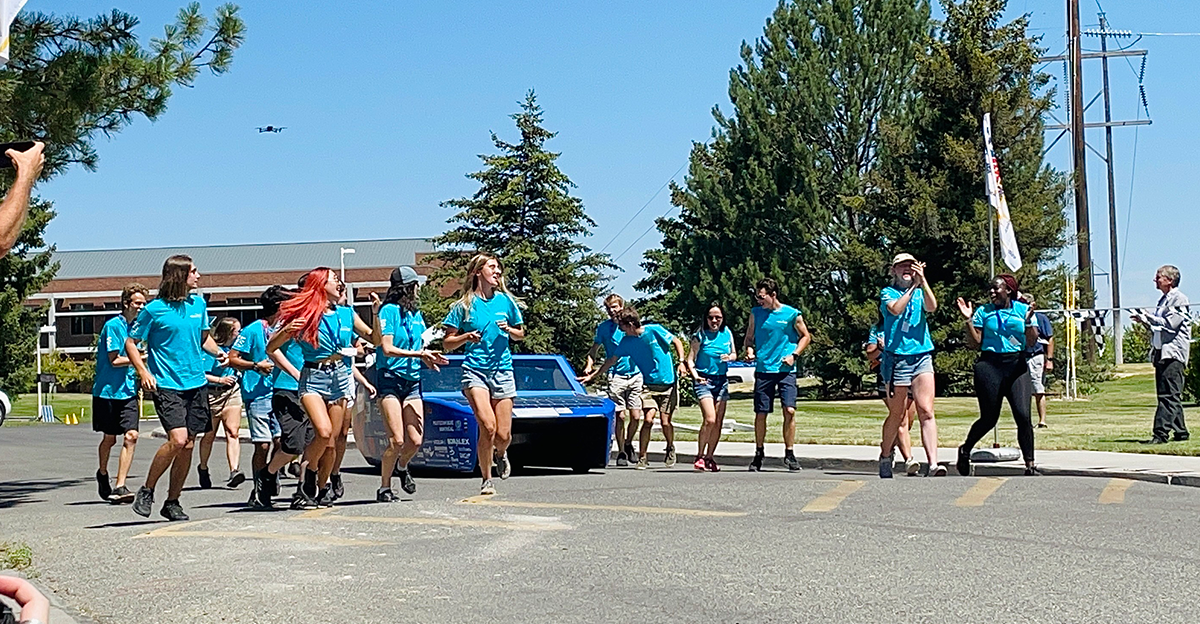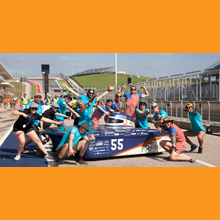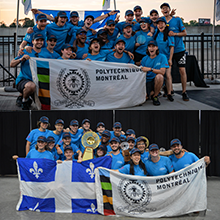Nouvelles
And the winner is… Projet Esteban! Poly-designed solar-powered car wins the Formula Sun Grand Prix and earns third place American Solar Challenge 2022 competitions
Esteban 10 - the first two-seat prototype in its history - and Polytechnique's technical society, won the annual Formula Sun Grand Prix closed-course competition in the multi-passenger vehicle category with all-solar power consumption: a first in the competition's history. Polytechnique students also placed third in the American Solar Challenge, held on American roads, and collected two awards for their vehicle.

Some 20 Polytechnique students in various engineering fields took part in the Formula Sun Grand Prix (pictured) and American Solar Challenge competitions, organized by the Innovators Educational Foundation in the U.S. (Photo: Project Esteban, solar car)
As part of a week’s worth of activities July 1-7 at Heartland Motorsports Park Raceway in Topeka, Kansas, the two-seater prototype Projet Esteban vehicle completed 270 laps of the track and traveled a total distance of 677.5 miles (1,090 kilometers) in three days, at an average speed of 30.8 miles per hour (49.5 kilometers per hour). A total of six teams competed in the multi-passenger car category.
This was the Polytechnique delegation's first participation in the Multi-Occupant Vehicle category, after competing in the single-seater car category for several years. The student technical society finished second in the rankings, based on person-miles traveled (total distance traveled by driver and passenger), with 1,355 person-miles or 2,180 person-kilometers. Additionally, Projet Esteban finished second in rankings based on completion factor (91.53%,) and earned sixth place in average speed.
“Brilliant-ly” low energy consumption
Despite the above successes, it was it’s remarkable energy consumption that enabled Projet Esteban to finish first overall: the prototype designed and built by Polytechnique students was powered solely by its solar panels and used an on-board battery with a storage capacity of only 9.18 kilowatt hours (kWh).
In comparison, the team with the second-lowest energy consumption used an on-board battery with a capacity of 15.649 kWh and an external load of 23.75 kWh, for a total of 39.39 kWh.
Based on a formula that takes into account four variables, in the overall rankings Polytechnique Montreal's technical society scored 135.4 points - far ahead of the University of Minnesota (35 points), and the University of Calgary (22.7 points).
As if these impressive successes weren’t enough, Projet Estaban was the first-ever multi-passenger vehicle category in the history of the Formula Sun Grand Prix history, to not use external electrical power during a competition.
"Our team is very proud to have won, and also to have achieved a never-before accomplished feat – they only told us about it at the awards ceremony!" said Gabrielle Boismenu, Project Esteban solar car President, and a fourth-year chemical engineering student. "In our vehicle category, connecting to an external source took away a lot of points. During the competition, other teams had to charge their vehicles with an external power source because they were heavier and less efficient."
"Members of our technical society optimized the aerodynamics, but also the weight of the car by making the vehicle components - the suspension, steering, chassis, etc. - as light as possible. Esteban 10 had the lowest weight of any vehicle in its class at 328 kilograms (723 pounds)," Boismenu added.
compete in the competition, Esteban had to successfully complete a dozen verifications. Over four days, vehicle dimensions, weight, and configurations, as well as its electrical and mechanical components, battery, solar panels, safety equipment, interior components, etc. were all exhaustively examined by a technical inspection and judging team. As part of the qualifications, Esteban also had to pass a series of dynamic tests, performing a U-turn, a figure eight, a slalom course, and a braking.
Project Esteban's participation in the Formula Sun Grand Prix concluded – if you’ll pardon the pun - with a proverbial day in the sun: an exhibition on July 8 in Independence, Missouri. The 20 undergraduate students from various engineering fields that make up the Polytechnique technical society presented the Esteban 10 to the general public, answered questions from curious onlookers, and successfully completed a test of the vehicle's real-life practicality by loading 7 suitcases into it.

Polytechnique’s Project Esteban solar car (center) with the University of Minnesota (left) and University of Calgary (right), at the conclusion of the Formula Sun Grand Prix (Photo: Project Esteban solar car)
A third place finish and a rewarding experience at the American Solar Challenge
After their victory in Kansas, Projet Esteban members then took part in the American Solar Challenge, a road race held from July 9 to 16 every two years. The event took place on public roads over 1,567 miles (2,522 kilometers) across five U.S. states, starting in Independence MO, and travelling to Twin Falls, Idaho, following the Oregon National Historic Trail.
Four teams drove up to the start line. During the first day of the competition, Esteban 10 experienced a setback when it missed a turn in the first leg of race route. Although Esteban was able to rejoin the official course route, it had extended its overall race distance by 5 miles (8 kilometers). As a result, the Polytechnic student technical society wasn’t able to grab the victory, owing to rules in the multi-passenger vehicle category.
"When we were notified of the situation at a checkpoint, we were offered two choices: we either could go back the way we came, or receive a penalty, as if we had used a trailer," explained Gabrielle Boismenu. "Since the first option would have greatly reduced our average speed when calculating rankings, so decided to go with the second penalty option - to be penalized until another team needed to use a trailer, but that didn't end up happening."
Intrepid Project Esteban members decided to continue their solar car adventure and completed the event, even earning in a first place finish on the final leg of the course.
The Polytechnique technical society placed third overall in the American Solar Challenge. Had it not been disqualified from winning, Projet Esteban would have finished first, with 142 points well ahead of the other two teams that completed the competition with 38.9 points and 0.42 points, respectively. Yet again, efficiency of energy consumption (based primarily on solar energy and only 3.27 kWh in external load) would have made the difference.
"We had a pretty odd situation that the judges had never faced before: they came to the conclusion that the rules were not suitable for our solar car class, so, the rules will change for the next competition in 2024. Sure, we’re disappointed with the situation, but it was our mistake and we take responsibility for it," commented Projet Esteban’s president.
"Continuing on with the competition took a lot of perseverance, but our goal was to have fun and learn by talking with members of other teams. We had the opportunity to converse with other future engineers about our and everyone’s innovations, and explain our engineering choices. We’re proud to have completed the race! Also, it may have allowed other teams to discover what they can improve on their vehicles."
It should be noted that at the American Solar Challenge Awards, Project Esteban received an award for the best energy efficiency in its category, as well as an award for the best vehicle aesthetics.
Project Esteban team members walked across the finish line alongside the Esteban 10 prototype at the end of the American Solar Challenge (Photo: Project Esteban, solar car)
Positive results overall
At the time of posting, the students are still on the way back to Québec, but Projet Esteban solar car members were positive about their experiences in the two student solar vehicle competitions in the United States.
"Everyone’s very pleased with our results, especially when you take into consideration that due to COVID-19, the 2020 Formula Sun Grand Prix and the American Solar Challenge were cancelled, so we couldn’t travel to the U.S. last year to compete. So, this year we returned to the competition, but with only one member who was present at the 2019 competition - there were a lot of unknowns for us!" said Gabrielle Boismenu.
"The competition wasn’t a walk in park – for instance, during the Formula Sun Grand Prix, some parts broke and needed to be repaired overnight. Also, we had a few turnarounds... but, having twenty motivated people working to solve the same problem was an extraordinary experience!"
Learn more
Projet Esteban – Solar Car website




